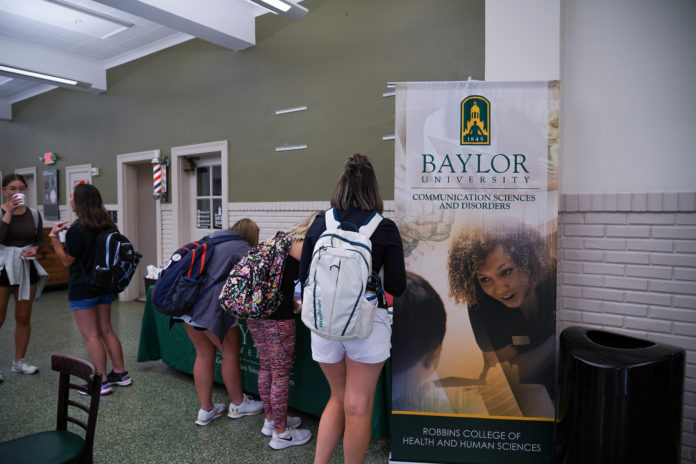
By Mariah Bennett | Staff Writer
Baylor’s National Student Speech-Language Hearing Association (NSSLHA) participated in national Student Advocacy Day with a come-and-go event on Wednesday in the Bill Daniel Student Center.
Baylor NSSLHA hosted a table with free HTeaO while it helped members and students email letters to their representatives in Congress, informing them about federal issues surrounding careers in the field of communication sciences and disorders, such as speech pathology and audiology.
According to the organization, there were a total of 150 emails sent to Congress. The event was coordinated by Savanna Espinoza, Cypress senior and Baylor NSSLHA service chair. There were both in-person and virtual options for participants.
“Student Advocacy Day for ASHA is where we have our NSSLHA members and communication sciences and disorders field members come by and advocate for their future,” Espinoza said. “We have different subjects they can email Congress on.”
Michaela Branch, Pearland senior and Baylor NSSLHA president, said she views Student Advocacy Day as a starting point in terms of getting future clinicians aware of some of these issues.
“In general, there are bills that speech-language pathologists and audiologists are in support of,” Branch said. “We want to make our Congress members aware of our support and why we want those bills to be passed as future speech-language pathologists and audiologists.”
Espinoza said one of the biggest issues is currently diversity in the field. According to the American Speech-Language-Hearing Association’s website, other issues include improving Medicare beneficiary access to audiology services and increasing federal funding for children with disabilities under the Individuals with Disabilities Education Act.
Branch said those in the communication sciences and disorders field provide care not only through speech therapy and audiology services but also through advocacy for access to said services.
“It’s a lot about making sure that no child is left behind,” Branch said. “That’s really important and really highlighted by Student Advocacy Day.”
Branch said that after Student Advocacy Day, it’s important to stay engaged with the status of policies, including those that aren’t the focus of this year’s event.
“It’s not only one letter to your representatives,” Branch said. “It’s a much more long-term commitment to getting those services covered and getting the resources the profession needs.”
Espinoza said it’s important for all Baylor students to participate because students never know if they may come across speech pathology or audiology services in their life.
“We’re everywhere, and we want to help,” Espinoza said. “By you taking five minutes out of your day to sign an email to your congressmen, it helps us better our future to help you in the future.”





